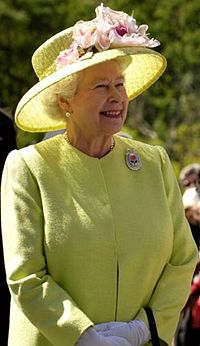Commonwealth of Nations
The Commonwealth of Nations (usually called simply "The Commonwealth") is a voluntary association of independent countries, nearly all of which were formerly under British rule. While remaining entirely responsible for their own policies, member countries choose to consult and co-operate on matters such as strengthening democracy, promoting human rights and working for social and economic development of poorer countries.
History
The transition from British Empire to Commonwealth of Nations began in 1867 with the transformation of Canada from a colony to a self-governing "dominion". It was followed by Australia in 1901, New Zealand in 1907, South Africa in 1910, and the Irish Free Stste in 1922. After the First World War, the Dominions sought a a new constitutional definition, and at the Imperial Conference in 1926, the prime ministers adopted the Balfour Report which defined the Dominions as autonomous communities within the British Empire, equal in status, though united by common allegiance to the Crown, and freely associated as members of the British Commonwealth of Nations. That definition was incorporated into British law in 1931 as the Statute of Westminster. It was adopted immediately in Canada, the Irish Free State, Newfoundland (which joined Canada in 1949) and South Africa. Australia and New Zealand followed. India became a Dominion at independence in 1947 and remained so until January 1950, when it became a republic.
Constitution
Membership
Membership of the Commonwealth has, since its beginning, been open to any independent state which was once ruled or administered by Britain or other Commonwealth countries, and recognises The Queen as Head of the Commonwealth. (In 1995, Mozambique became the first country to join which had not previously had such links with Britain, being a former Portuguese colony.) Almost all countries, when they became independent of the United Kingdom, have chosen to join the Commonwealth but, since the ink is entirely voluntary, any member can withdraw at any time - the Republic of Ireland did so in 1949,as did South Africa in 1961 (subsequently rejoined in 1994). Zimbabwe withdrew in 2003.
Policies and programmes
Human Rights
The Secretariat maintains a human rights unit[1]
Activities
Commonwealth Games
Since 1930, the athletes of the Commonwealth have come together in an Olympic Games-type atmosphere every four years, halfway between each Olympiad. The first Commonwealth Games (then called the Empire Games) was held in Hamilton, Ontario [2]
Commonwealth Day
At the 1975 CHOGM, Canada proposed an annual 'Commonwealth Day' to focus attention on the organisation and its global activities. The following year, the second Monday of March was agreed upon, and 1977 saw the first simultaneous observance day throughout the Commonwealth. The day was chosen as one when most children would likely be in school; this would be an opportunity for the younger generations to learn about their shared heritage.[3] The day has since been extended to an entire 'Commonwealth Week' around that time.[4] To mark the day, the Head of the Commonwealth issues a message; for example, in 2008 Queen Elizabeth II chose to focus on climate change, with a theme which emphasised environmental choices in all sections of society.[5]
The Future of the Commonwealth
References
- ↑ Human Rights, Commonwealth Secretariat
- ↑ History of the Commonwealth Games 1930-2006, Reuters, 2010
- ↑ Commonwealth Secretariat: 'Commonwealth Day in the archives'.
- ↑ Commonwealth Secretariat: 'Commonwealth Week News'.
- ↑ Commonwealth Secretariat: 'A message from Her Majesty The Queen, Head of the Commonwealth'. 10th March 2008.
